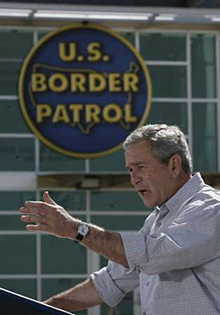 |
 |
 |
 Editorials | Issues | April 2007 Editorials | Issues | April 2007  
US Immigration Reform Will Not Happen
 Angie C. Marek - US News Angie C. Marek - US News


| | US President George W. Bush delivers remarks on his immigration reform plan near the United States border with Mexico in Yuma, Arizona, April 9, 2007. (Reuters/Jason Reed) |
Washington — Calling immigration reform "a matter of deep conviction for me," President Bush loosely outlined an immigration-reform proposal on this week that would include a guest-worker plan and some way for people in the country to legalize their status after paying what he called a "meaningful penalty."

In a speech at the border in Yuma, Ariz., Bush also sounded a rare note of hope about the Democratic-controlled Congress, saying of Washington, "I think the atmosphere is good up there right now" to get something done on immigration.

But few in the nation's capital would most likely agree.

In recent weeks, after months of closed-door negotiations, a bipartisan bill being worked on by Sens. Edward Kennedy and John McCain failed to materialize. (Insiders say McCain was unhappy with union provisions Kennedy was interested in inserting into the measure.) A subsequent draft of possible reforms the White House crafted behind closed doors with Senate Republicans received slashing criticism from longtime Bush allies in the business community. And on the House side, Speaker Nancy Pelosi has added her own constraints to the debate.

"I'm still cautiously optimistic," says Tamar Jacoby, a Republican with the Manhattan Institute who has long favored guest-worker reforms. "But there's no question that time is short and that some people might rather have a political talking point than a real solution."

For the White House, some of the biggest challenges could come from the Senate. Although some 23 Republican senators backed a fairly moderate guest-worker bill last year, Jacoby says "the environment now is entirely changed." The administration wants at least 25 Republicans on board this time, and many are hedging their bets with an eye to the 2008 elections.

A White House document suggested eliminating some of the visa categories that allow current immigrants to bring over adult children or parents and giving those visas to high-skilled workers. The administration also suggested charging immigrants unprecedented penalty fees: Immigrants would have to pay $10,000 to earn a green card. The roughly 12 million illegal aliens currently in the country could also apply for temporary Z visas—work permits that could be renewed every three years for a $3,500 fee.

Advocacy groups responded early on to the bill by arguing that such stringent penalties would only push workers deeper into the shadows and out of mainstream society. Thousands of people came out this past weekend in Los Angeles to protest the proposal.

In Washington, Democratic heavyweight senators, one Hill staffer said, are still debating whether they want to join the administration-led deliberations and try to shape the White House proposal into a legitimate starting point for debate.

"They're not negotiating yet," said the staffer." They're negotiating over whether even negotiating on this is feasible."

In the House, progress is equally murky. Pelosi has said she won't put new, moderate Democratic members in a vulnerable spot. Although Democrats tend to support comprehensive immigration reform, Pelosi says she won't bring a guest-worker bill to the floor for a vote until she's confident at least 70 Republicans will stand behind it. Last year House Republicans succeeded in passing a get-tough immigration bill that would have made presence in the country illegally a felony, as opposed to the civil violation it is today.

"This effort must be bipartisan," says one Hill aide, "for us to be convinced Democrats aren't stepping into a trap just before the 2008 elections."

Still, Bush is betting that even with low popularity figures, his visit to the border can draw some attention to some recent border success stories. Hard-line Republicans in the past have said they might cooperate with the administration if they're convinced the border is more secure.

The Yuma sector of the border—a 118-mile stretch of land that runs from the Imperial Sand Dunes in California through Yuma County in Arizona—has seen the most dramatic drop in the number of arrests of illegal border crossers in recent months. Border Patrol agents had 68 percent fewer arrests in the Yuma sector from October to March 31 than they had in the same period the year before. Those figures are often used as a gauge of the number of people trying to cross.

Bush said though that even with fencing, National Guard troops on the border, and technology like unmanned surveillance drone aircraft, Congress still needs to "take the pressure off the border" by creating a new channel of visas that workers could use to come to the country legally through immigration reform.

"It's important for [Congress] to listen to everyone's position," Bush told the Arizona crowd." And it's important for people not to give up, no matter how difficult it looks from a legislative perspective." That's advice the administration better hope sinks in. | 
 | |
 |



